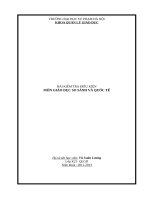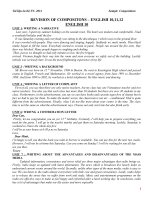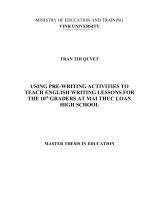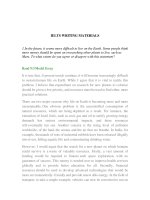BÀI VIẾT THAM KHẢO CHO đề IELTS WRITING 300520 BY NGOCBACH
Bạn đang xem bản rút gọn của tài liệu. Xem và tải ngay bản đầy đủ của tài liệu tại đây (755.16 KB, 6 trang )
BÀI MẪU THAM KHẢO ĐỀ IELTS WRITING 30/05/2020
BY NGOCBACH
Note: Vì biểu đồ do 1 bạn học sinh đi thi vẽ lại nên số liệu có đơi chỗ chưa được chính xác lăm.
Mình có thay đổi số liệu 1 chút cho hợp lý hơn
+ Để tìm hiểu thơng tin về các khóa học, bộ sách mới nhất của thầy Bách, các bạn truy cập: www.ngocbach.com
+ Hotline tư vấn đăng ký học: 0974657403 (email tư vấn: )
1
Task 1:
The charts compare the numbers of people per household in the UK in 1981 and
2001
over
6
5-6
people
3-4
people
2
people
1 person
1981
2001
Report Plan:
Paraphrase paragraph: compare>show; per household in the UK>who lived
in UK households
Summary/overview paragraph: (1) highest % of households had 2 people, or
had 3-4 people (2) % of households with 1 person or 2 people increased from
1981 to 2001
+ Để tìm hiểu thơng tin về các khóa học, bộ sách mới nhất của thầy Bách, các bạn truy cập: www.ngocbach.com
+ Hotline tư vấn đăng ký học: 0974657403 (email tư vấn: )
2
Paragraph 3: report and compare the figures for households with 1 or 2
people (these percentages increased)
Paragraph 4: report and compare the figures for households with 3-4, 5-6
and over 6 people (these percentages declined).
Report:
The bar charts show the percentages of people who lived in UK households in 1981 and
2001, according to the number of people in each household.
Overall, the highest proportion of households comprised either 2 people or 3-4 people.
The percentage of households with 1 person or 2 people witnessed a significant rise in
2001.
In 1981, the proportion of single person households was 17%, and this figure saw an
increase of 9% by 2001. There was also an increase in the percentage of households with
2 people, rising from 31% to 34% over the period.
In contrast, the figure for households occupied by 3-4 people declined significantly,
from 38% in 1981 to 30% in 2001. The proportion of people living in larger households
was much smaller, and this figure also fell during the period. However, this decline was
gradual, from 8% to 6% for households with 5-6 people, and from 6% to 4% for those
with more than 6 occupants.
161 words
Task 2:
Some education systems make students focus on certain subjects at the age of 15,
while others require students to study a wide range of subjects until they leave
school. What are the benefits of each system? Which is better?
Essay plan:
•
Introduction: refer to the task question. My opinion: studying a wide range
of subjects is better
•
Paragraph 2: the benefit of specialising – example: focusing on maths and
science prepares students to get a job when they leave school
+ Để tìm hiểu thơng tin về các khóa học, bộ sách mới nhất của thầy Bách, các bạn truy cập: www.ngocbach.com
+ Hotline tư vấn đăng ký học: 0974657403 (email tư vấn: )
3
•
Paragraph 3: the benefits of a broad education (1) preparation for life by
stimulating interest in a range of subjects; examples: philosophy, literature
and history (2) a wide range of subjects encourages critical thinking,
imagination and creativity – art, drama, music
•
Conclusion: although each system has benefits, a wide range of subjects is
better
Essay:
Education systems vary across the world, with some forcing students to specialise when
they reach 15, whereas others encourage a wider range of learning. While both systems
have advantages, I firmly believe that school students should acquire a broad education.
On the one hand, if students concentrate on particular subjects at the age of 15, then they
will be able to cover a lot of ground in those subject areas. For example, if students at
this age study only maths and sciences, they will be able to spend all of their school day
on these lessons. They will not have the distraction of studying languages or the arts.
They will have a good grasp of their chosen areas of study, and will therefore be well
equipped to put the knowledge that they have gained into practice. This system thus
improves their job prospects when they leave school.
On the other hand, I favour a system in which students study a wide range of subjects
throughout their years at school. I would argue that this system is better for two
important reasons. Firstly, a broad education is a preparation for life. Schools must
encourage youngsters beyond the age of 15 to be interested in all aspects of life, by
exposing them to subjects such as philosophy, literature and history. Secondly, studying
a range of subjects until they leave school, students have the chance to develop critical
thinking, imagination and creativity. They may start to learn how to express themselves
through painting, drama and writing, taking up a musical instrument or singing in a choir
at school.
In conclusion, although at 15 students may be better prepared for work by concentrating
on only a few subjects, studying a wide range of subjects prepares them to develop for
life.
296 words
Vocabulary from education:
+ Để tìm hiểu thơng tin về các khóa học, bộ sách mới nhất của thầy Bách, các bạn truy cập: www.ngocbach.com
+ Hotline tư vấn đăng ký học: 0974657403 (email tư vấn: )
4
•
to cover a lot of ground
Meaning: to deal with much information and many facts.
Example: The history lecture covered a lot of ground today.
• to have a good grasp of something
Meaning: to understand a problem deeply and completely
Example: Children who begin to learn a foreign language in primary school are
usually able to have a good grasp of the new language quickly.
Vocabulary from work:
to put knowledge gained into practice
Meaning: to put to practical use the knowledge that you have acquired
Example: Vocational training courses enable students to put the knowledge
gained during their studies into practice.
job prospects
Meaning: the chances of being successful and having more opportunities at work
Example: People with qualifications and experience usually have the best job
prospects.
Vocabulary from the arts:
to express oneself
Meaning: to communicate some idea or emotion through speech, writing, painting,
music or some other form of art
Example: Schools should encourage pupils to express themselves through art,
music or creative writing in order to stimulate their imagination.
to take up a musical instrument
Meaning: to start to learn to play a musical instrument
Example: Schools should encourage all those children who have an interest to take
up a musical instrument.
+ Để tìm hiểu thơng tin về các khóa học, bộ sách mới nhất của thầy Bách, các bạn truy cập: www.ngocbach.com
+ Hotline tư vấn đăng ký học: 0974657403 (email tư vấn: )
5
to sing in a choir
Meaning: to sing in a group of people, for example in a church or public
performance
Example: One way that schools can encourage children to enjoy music is to give
them an opportunity to sing in a school choir.
Other vocabulary:
•
to force [verb]:
Meaning: to make somebody do something
Example: The dangers of the corona virus forced people to stay at home.
• to acquire [verb]:
Meaning: to obtain something because it is given to you
Example: She acquired a lot of information for her essay on the Internet.
• distraction [noun]:
Meaning: something that takes away your attention from what you are doing
Example: I can’t listen to music when I’m trying to study. It’s a distraction.
• to expose (somebody to something) [verb]:
Meaning: to enable somebody to discover something by giving them experience of it
Example: The teacher exposed the children to the work of Shakespeare by taking them to
see one of his plays at the local theatre.
+ Để tìm hiểu thơng tin về các khóa học, bộ sách mới nhất của thầy Bách, các bạn truy cập: www.ngocbach.com
+ Hotline tư vấn đăng ký học: 0974657403 (email tư vấn: )
6









